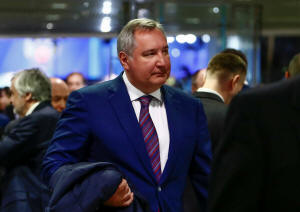Russian space chief says cooperation with Europe now impossible
 Send a link to a friend
Send a link to a friend
 [March 25, 2022]
(Reuters) - Russia's space director
said on Thursday that Europe had wrecked cooperation by imposing
sanctions against his agency, and rockets that were meant to launch
European satellites would now be used for Russian companies or countries
friendly to Moscow. [March 25, 2022]
(Reuters) - Russia's space director
said on Thursday that Europe had wrecked cooperation by imposing
sanctions against his agency, and rockets that were meant to launch
European satellites would now be used for Russian companies or countries
friendly to Moscow.
Dmitry Rogozin, head of Roscosmos, said in a Chinese television
interview that this would apply to about 10 rockets.
"At this moment, after the European Space Agency and the whole European
Union have taken a frenzied position on the conduct of (Russia's)
special military operation in Ukraine and introduced sanctions against
Roscosmos, we consider further cooperation impossible," Rogozin said.
The space rift has had a tangible impact since Russia invaded Ukraine on
Feb. 24 and was hit with a wave of international sanctions.
The European Space Agency said last week it was suspending cooperation
with Roscosmos over the ExoMars rover mission to search for signs of
life on the surface of Mars.
On Monday, British satellite venture OneWeb said it had contracted with
Elon Musk's SpaceX to send its satellites into orbit after calling off a
March 4 launch of 36 satellites from Russia's Baikonur Cosmodrome in
Kazakhstan because of last-minute demands imposed on it by Moscow.
[to top of second column]
|

Russia's Roscosmos space agency Director General Dmitry Rogozin is
seen before President Vladimir Putin's annual address to the Federal
Assembly in Moscow, Russia January 15, 2020. REUTERS/Maxim Shemetov
 Rogozin said a resumption of space
cooperation with Europe in some form would only be possible if the
European side reflected on "what they've destroyed with their own
hands" and held a frank conversation with Moscow.
Rogozin has previously said that sanctions imposed against Russia
could "destroy" U.S.-Russian partnership on the International Space
Station, from which two Russians and an American are due to return
to Earth on March 30.
(Reporting by Mark Trevelyan in London; editing by Grant McCool)
[© 2022 Thomson Reuters. All rights
reserved.]
This material may not be published,
broadcast, rewritten or redistributed.
Thompson Reuters is solely responsible for this content. |